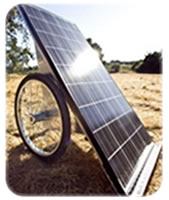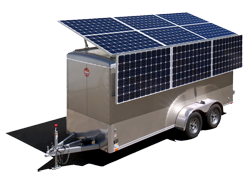Generators are typically used to provide electricity during power outages (e.g., during storms, emergencies, or related disaster-relief operations) or in off-grid situations or areas where there is no access to a built-in power source (e.g., on construction sites, on camping trips, or at outdoor events—for concert stages, food booths, etc.). So, in a nutshell, they’re mostly used for temporary, portable/mobile, back-up, or remote power needs.
Conventional generators have a number of downsides. They require gasoline (or diesel fuel), which can be expensive—especially during emergencies, when there can also be gas shortages. The stinky emissions from gas-powered generators also contribute to air pollution and climate change, and they can cause carbon monoxide poisoning when placed inside a home or building, or too close to doors, windows, or vents on the outside of a building. (In fact, several people who were using generators due to Hurricane Sandy died from carbon monoxide poisoning.) Furthermore, gas generators are very loud.
Solar (electric) generators provide a smart, silent, safe, and clean alternative that uses renewable energy (no fuel = no emissions), and there are a number of products available to choose from these days. NOTE: The electric power backup battery/stations can also just be charged up by plugging them into an outlet when the electricity is on (prior to an outage); you don’t have to use solar panels to charge/recharge them, but solar panels could help keep them charged up during an extended outage. (Biodiesel or hybrid generators are other options to consider.)
Below is a list of the U.S.-based solar generator/electric battery backup-power brands that I’ve looked into so far; this is not a comprehensive listing. New products have been coming out every year. If you know of other brands of solar generators and would recommend them, please let us know in the Comments. Thanks!
 Small-Scale, Compact Units
Small-Scale, Compact Units
These solar generators and electric backup-power units are designed to provide a modest amount of electricity for temporary, emergency, or low-use power needs. The smallest units can easily charge gadgets and power lights, but do not have the capacity to run large, power-hungry equipment or appliances (e.g., refrigerators or heaters) for more than a short time. (For example, a 1500-watt unit can generally only run a small space heater for up to 2 hours or so at night, when the unit is not being recharged by the sun.) The cost of solar panels continues to go down, and battery and photovoltaic technologies are evolving rapidly. More products are sure to come out, so do an Internet search for “solar generators” to find additional offerings beyond these:
Jackery (based in California) [added in 2022]
Lycan Powerbox (from Renogy, based in Southern California) [added in 2019]
Yeti (from Goal Zero, based in Utah) [added in 2015]
CM from Coyle Solar (based in North Carolina) [added in 2021]
SolMan (from Sol Solutions, based in Northern California)
Ready2Go (from E.A.R.T.H., based in Hawaii and Southern California)
SUNRNR (A.K.A. Sun Runner, based in Virginia)
And people who have solar photovoltaic panels installed on their property can add battery storage via products like the Powerwall; the SolPad; or other competing storage products on the market. That way, a solar array can be used even when the power grid is down, or in off-grid settings.
Larger Systems
Some of these are intended for use on construction job sites or public works projects. Most are mounted on trailers that can be towed. While many of these generators are meant for commercial/industrial uses, some could also potentially be used to power an entire off-grid homestead or to help with disaster relief and emergency services.
Sesame Solar Nanogrids (based in Michigan) [added in 2024]
Ecos PowerCube (based in Florida) [added in 2014]
CM from Coyle Solar (based in North Carolina) [added in 2021]
Mobile Solar Power (based in Central California)
Solarrolla solar trailer charging stations (based in Wisconsin)
[added in 2024]
SolaRover (based in Colorado)
Some companies offer hybrid systems that allow for back-up generation using biodiesel, if solar power is not providing enough power for a user’s needs.
Please chime in with additional info and recommendations based on your own experience or knowledge of solar or biodiesel generators!
Related posts: Resilience: Disaster-Resistant, Adaptive, and Restorative Design and Planning [Feb. 2013] and Tips for Emergency Preparedness and Disaster Response [2019]

{ 7 comments… read them below or add one }
Love the points here, looking into making a sort of DIY power setup for myself soon. Can’t wait to delve into this sort of stuff. Hopefully it’ll be something to be proud of when I’m done, wish me luck!
Certainly, but we all need to realize that adding Solar to their house is an asset which could increase the long term value of their home if / when they make a choice to sell. With the environment the way it is going we are not able to dismiss any product that provides 100 % free power at no cost to both the buyer and more notably the earth!
I’ve never seen one of those mobile solar panels before, it looks fantastic!
Great post, thanks for the links and info
Yep, grid-tied systems will shut off during a power outage. But it is possible to get a battery back-up for a grid-tied system, to help provide a little power during outages.
Thanks for the follow up! I wasn’t aware that grid-tied systems don’t work during power outages. I’m definitely not an electrical engineer, but I had envisioned the PV array being connected first to your home & then to the grid. Is this not the case?
Hi Brian,
Indeed, for people who have the ability ($$, ownership status, and adequate south-facing area) to install a permanent PV system for their home or business, that’s a good way to go. But if it’s a grid-tied system (rather than an off-grid system), it won’t work during a power-outage. Also, there are other situations and circumstances where only a portable/mobile generator would fit the bill, e.g., for mobile disaster-relief operations, on temporary construction sites, on camping trips, or at outdoor events—for concert stages, food booths, etc.; or for people who rent or lease a home or building. It’s also conceivable that some permanent solar arrays could been damaged by especially strong storms, and generators could provide back-up power.
Interesting information! I had no idea these things existed. The odd part of it (maybe just from my perspective) is why you wouldn’t just set up PV panels permanently at your home or business. That way you could actually benefit from their power production year round (hopefully) and in an emergency as well (plus they’re already set up!).